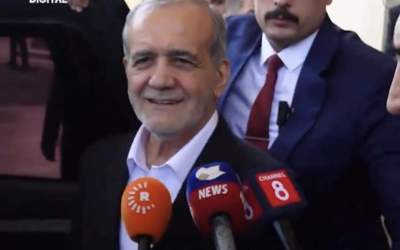Saturday 11 December 2021 - 12:47
Story Code : 392317
Iran condemns politicization of fulfillment of humanitarian needs
Ambassador and Deputy Permanent Representative of Iran to the United Nations, Zahra Ershadi, read a statement on �Strengthening of the coordination of humanitarian and disaster relief assistance of the United Nations, including special economic assistance�, before the UN General Assembly on Friday.
The following is the full text of her speech:
�The nature and extent of humanitarian situations have changed dramatically, as new dimensions have emerged over the course of decades. As a result, the international community has faced evolving challenges as it works towards addressing these emergencies in a comprehensive and coordinated manner. With an increasing number of people suffering from the impacts of natural disasters, the extent and frequency of such occurrences have � in addition to hindering the development of disaster-stricken countries � eroded the capacity to address events of such nature. Humanitarian emergencies also occur as a result of ever-increasing armed conflicts and targeting of innocent civilians. Hence, we concur with the Secretary-General that �Humanitarian needs soared in 2020, propelled by conflict, climate change and the coronavirus disease (COVID-19) pandemic�.
My delegation acknowledges the leading role of the United Nations Office for the Coordination of Humanitarian Affairs. We are of the view that sustainable tackling of humanitarian situations requires mobilizing resources by taking anticipatory financing approaches in the UN budgetary system. In this regard, those who serve as the main contributors in protracted wars and occupations by their involvement or through provision of sophisticated weapons should shoulder more burden in financing UN humanitarian responses. This also includes those that have historical responsibility due to GHGs emissions that lead to rapid climate change resulting in natural disasters.
This year, we commemorate the thirtieth anniversary of the adoption of landmark resolution 46/182 as a solid foundation for humanitarian activities and responses. Based on this resolution, we believe that all of the principles and purposes of the UN Charter, notably respecting the sovereignty and territorial integrity of States, should be strictly observed by all when providing humanitarian assistance. While emphasizing the primary role and responsibility of States in addressing humanitarian emergencies within their territories, national ownership and leadership in coordination of humanitarian assistance to ensure its effective delivery must be acknowledged. In the same vein, any humanitarian crises or emergencies, especially those that have been advertently created under a specific and hidden political agenda, must not lead to any foreign intervention under the pretext of responsibility to protect.
Taking note of the Secretary-General�s calls for a global ceasefire and humanitarian pause as a temporary solution for providing humanitarian assistance to those in dire need, the Islamic Republic of Iran strongly believes that addressing the root causes of humanitarian crises and emergencies as well as a greater investment in their prevention are the main sustainable and durable solutions for this global phenomenon. This includes both natural disasters and man-made crises, including but not limited to occupation, foreign military interventions and the imposition of illegal and inhumane Unilateral Coercive Measures. In this regard, we stress the significance of liability and accountability. Therefore, we express our disappointment with the Human Rights Council�s failure to renew the mandate of the Group of Eminent Experts on Yemen on 7 October 2021.
While being committed to protection of the United Nations and humanitarian personnel on mission, the Islamic Republic of Iran emphasizes that the sanctity of humanitarian assistance activities, including the credibility of the United Nations humanitarian response system, must be preserved by upholding its purely humanitarian nature through observing the humanitarian principles. Legitimate concerns regarding the deviation of humanitarian aid as well as non-humanitarian activities under the guise of providing humanitarian aid must be met immediately with a thorough and independent investigation.
We strongly condemn situations wherein the humanitarian needs of populations in dire needs are taken hostage as a political mean or military tool, including by imposing blockades to starve to death civilians. Furthermore, the United Nations must assure that all humanitarian aid should be distributed among all populations in need indiscriminately and without any interference by donors.
There are many humanitarian crises around the world that require our swift attention. Regarding the humanitarian situation in Afghanistan, as winter approaches and the situation of the Afghan people continues to deteriorate, the timely provision of humanitarian assistance and the release of Afghanistan�s frozen assets, which are essential for reviving its economy and saving lives, should in no way be politicized or conditional. Therefore, every effort should be made to ensure that the countries hosting Afghan refugees, especially its neighbors, have unhindered access to humanitarian goods as well as vaccines.
With regards to Palestine, in particular the besieged Gaza strip, we note with great concern the obstacles and impediments created by the occupier regime in Palestinian territories on the movements, humanitarian access and operational space as contained in the Secretary-General�s report A/76/78. Since 2000, nearly 22-hundred Palestinian children have been killed. During the same period of time, 18-thousand-five-hundred Palestinian children have also been arrested.
The Islamic Republic of Iran considers the inhumane and illegal UCMs not only as one of the main obstacles which hinder international efforts to provide humanitarian assistance but also as one of the main sources in creating humanitarian crises and devastating humanitarian principles around the world. The UCMs also undermine the targeted countries� abilities, including those of mine, to meet their commitments according to relevant treaties and conventions, including the Sendai Framework for Disaster Risk Reduction. We strongly reject the imposition of UCMs by a number of certain states as a political leverage, especially during the COVID-19 pandemic. Even in times of the deadly coronavirus, the United States� illegal and inhumane unilateral coercive measures have targeted innocent Iranian citizens by freezing our assets in foreign banks � the assets which we desperately wanted to use for the provision of vaccines and other humanitarian needs.�
Source: Tasnim
# Tags










